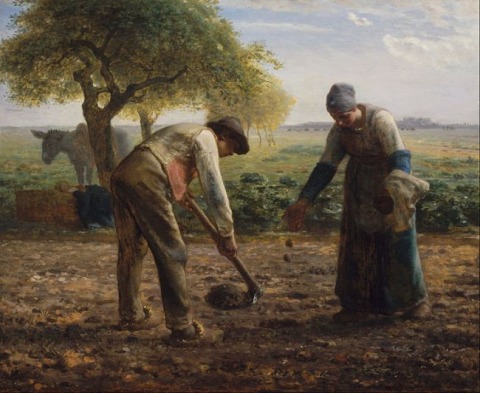
Natural law inescapably concerns human nature. Not only do the heavens proclaim the glory of God; so do our own minds and bodies. We are fearfully and wonderfully made, creatures of pattern, design, and inbuilt meaning.
A corollary of the designedness of things is that every desire in us is for something. Thirst is directed toward drink; hunger is directed toward nourishment; sexual attraction is directed toward turning the wheel of the generations. Of course these things are also pleasurable, but there is a proper context for every pleasure, otherwise we would all think it good to be gluttons. The proper context for sexual pleasure is the union of the procreative partners.
We will return to specifically sexual longing tomorrow. For now, let me consider something odd about longing in general.
Each of the desires I have mentioned is satisfied by something in the created order. Drink satisfies the desire for drink, food satisfies the desire for food, intercourse satisfies the desire for intercourse. Yet we have one longing – it has no name, but most people feel it obscurely – which cannot be satisfied by anything in the created order whatsoever. C.S. Lewis calls it “That unnameable something, desire for which pierces us like a rapier at the smell of bonfire, the sound of wild ducks flying overhead, the title of The Well at the World's End, the opening lines of ‘Kubla Khan,’ the morning cobwebs in late summer, or the noise of falling waves.”
If it is really true that “nature makes nothing in vain,” then this longing too must be for something. But if it is not directed to anything in the created order, then its purpose must be to direct us beyond, to the Creator. Nature points beyond herself. She has a face, and it looks up.
If we refuse to look where she is pointing, then we may lavish on her all the loving looks that she wants us to bestow somewhere else. We give to created things the worship that is due to the Creator. Created things like what? Like sexuality. Perhaps this is because erotic longing stirs up that other wild-ducks longing more strongly than most longings do.
One would think that at least the idolatry of sex would always be an idolatry of love in sex. Amazingly, no. It is even possible to make an idol of the absence of love in sex. David Loovis’s description of anonymous intercourse is unmistakably religious: "an irresistible experience of beauty in the person of the stranger ... one of the most mysterious and awe-inspiring in the entire homosexual galaxy of experience."
Idolatry is so tiring. Even the idolater must sometimes rest from the toil of denial. His friends must stand ready for the moment when he relaxes the awful tension of his mental censors.
Tomorrow: Part 3. This seven-part series is adapted from my chapter in a book to be published by Ignatius Press.